From its products to its processes, the 75-year-old foam source is focused on improving the environment — and the world.
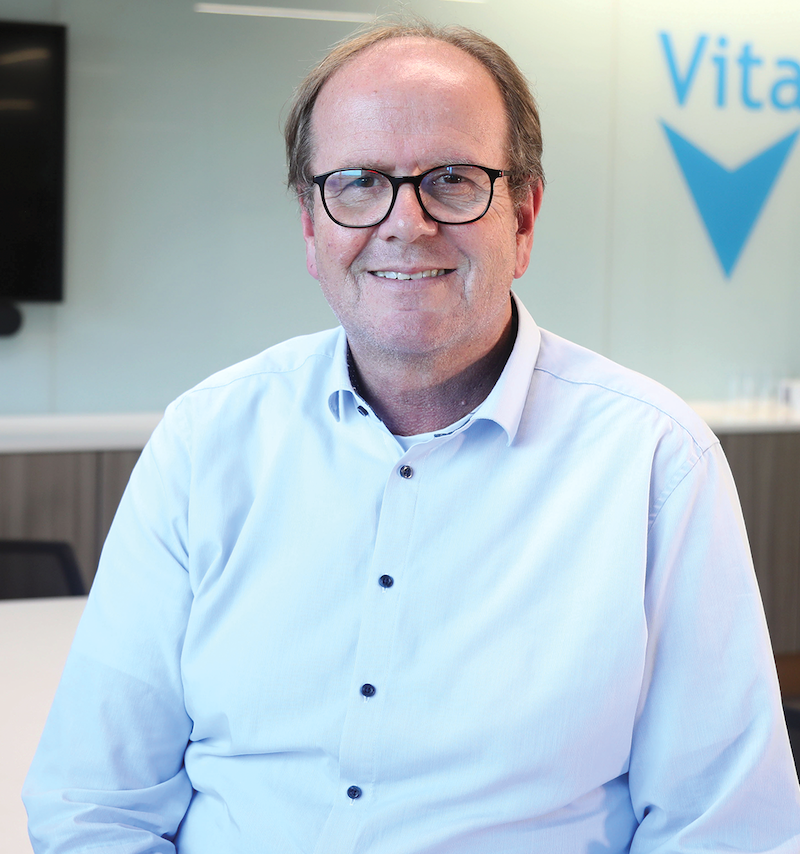
Sustainability plays a central role in every aspect of The Vita Group’s operations, starting with its website, where a link to its Sustainability Report appears on the homepage. In the report, the Middleton, England-based producer of flexible polyurethane foams and latex outlines its commitment to sustainability, both in its products and in its operations, and describes the progress it is making in achieving its ambitious goals.
Since the most recent report was issued last summer, Vita has transitioned to the leadership of CEO Omar Hoek. Hoek replaced CEO Ian Robb in October as part of a succession plan from the company’s owner, Strategic Value Partners. The Greenwich, Connecticut-based global investment firm bought Vita from TPG Capital in 2018.
In a statement announcing his appointment, Hoek praised the outstanding team Robb had assembled at Vita and cited the “strong sustainability credentials of the business” as a key asset in taking Vita to the “next horizon of growth.”
“The Vita Group is in fantastic shape,” Hoek says. “Thanks to our quality people, innovative products and forward-thinking focus on sustainability, we are well positioned to strengthen our role in the marketplace and expand our reach with new and existing customers.”
Hoek joined Vita with three decades of experience across a diverse mix of industries. During his career, he has managed global organizations across Europe, Asia and the Americas, leading efforts in supply chain management, product development, sales, strategy and procurement. His experience includes a nearly 20-year tenure with packaging and lamination giant Avery Dennison, as well as stints with fiber specialists Newell and Ahlstrom and specialty materials source Mativ. Materials processing has been a common denominator throughout his career, but his position at Vita marks the first time Hoek has been involved in the flexible polyurethane foam arena.
“Foam bedding provides a very long, single-use solution of seven to 10 years for consumers, and then they replace it,” Hoek says. “Because the mattress typically isn’t being transferred to someone else or used in some other fashion, the materials that are in it lose their utility and end up being disposed. As a producer of foam, we have a responsibility to find new ways to repurpose these discarded materials so items disposed to landfill can be reduced.”
Interzum-lauded advancements
Vita’s efforts in this area were on full display during the 2023 Interzum Cologne show in Cologne, Germany. At the furniture industry fair, Vita won four Interzum awards in recognition of its sustainable foam technologies, including the Best of the Best award for its VitaFirst mattress.
VitaFirst features two sustainable foams: Orbis Plus MB (more about MB in a minute) and Novus. Orbis is a polyurethane foam made with raw materials sourced from recycled post-consumer foam mattresses. To create Orbis, Vita partnered with Dow’s Renuva mattress recycling program, which recycles polyurethane foam from end-of-life mattresses and turns it into Renuva polyol for use in new mattresses and other applications.

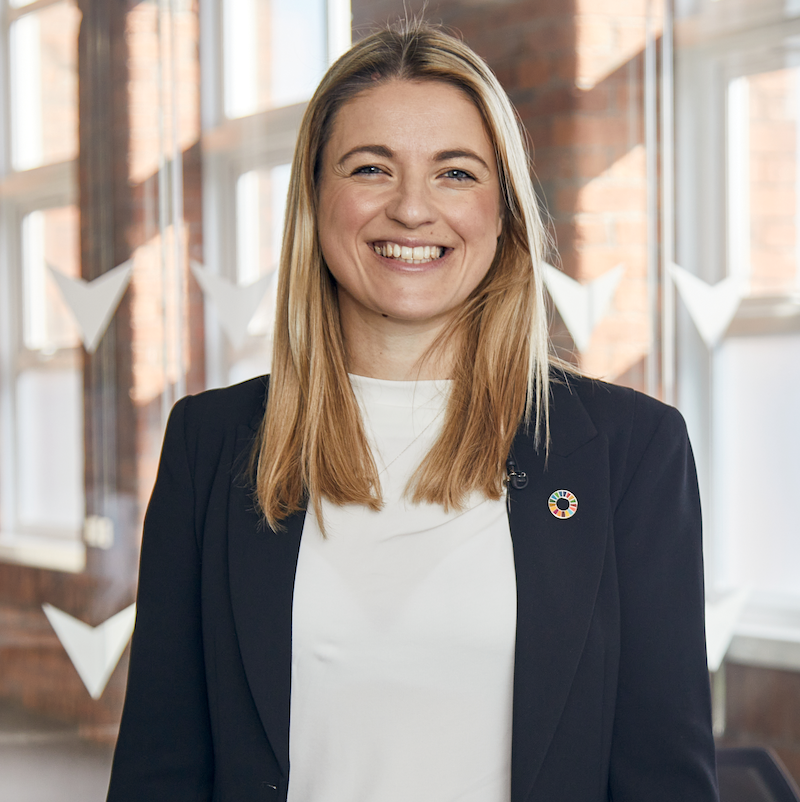
Novus is a reconstituted foam constructed by bonding granulated post-production trim foam. For the VitaFirst mattress, a low-density grade of Novus foam is used to enhance comfort.
The layers of the VitaFirst mattress are profiled with edges and grooves so that they mechanically interlock without the need for adhesive or any type of mechanical fixing, enabling easier end-of-life dismantling and recycling. The mattress is covered with a material certified by the Global Recycled Standard.
At Interzum, three other Vita products — Orbis Plus, Orbis Plus MB and Orbis Next MB — also were honored with the show’s High Product Quality award.
Orbis Plus uses a variable combination of bio-based polyol and Renuva recycled polyol, with a goal of 100% sustainable polyol content. Orbis Plus MB incorporates the same polyols formulation as Orbis Plus, using a next-generation TDI (toluene diisocyanate). A key ingredient in flexible polyurethane foams, the TDI used in Orbis Plus MB is made by Covestro from bio-based and fossil sources with the bio-based part calculated by using a mass balance chain of custody method. The mass balance approach allows fossil-based and alternative-sourced feedstock chemicals (in this case, bio-based chemicals) to be mixed in production, but accounted for separately on paper to allow the alternative-sourced chemical to be attributed to specific outputs. Orbis Next MB is a concept foam that features 100% recycled polyol made in partnership with Evonik, as well as bio-circular attributed mass balance TDI. These products are then combined with Vita’s recycled polyol formula to produce a sustainable foam.
These new products allow Vita and its partners to offer foams with a reduced impact on the environment while still delivering the quality, durability and comfort that mattress producers expect, says Mark Lewis, regional director for bedding.
“We opened a lot of eyes about the design possibilities of these sustainable foams.”
“Interzum generated a good deal of buzz for us,” Lewis says. “We opened a lot of eyes about the design possibilities of these sustainable foams, and we’ve had many discussions with customers about them since the fair. Commercializing something new like this will take time, but we are pleased by the response so far.”
Science leads the way
To provide manufacturers and consumers with a better understanding of the benefits of recyclable, recycled and bio-based foams, Vita has developed a life cycle analysis to measure the environmental impact of its products. According to the company, the internal analysis follows the protocols of the ISO 14044 standard, producing data that is then verified by independent third parties.

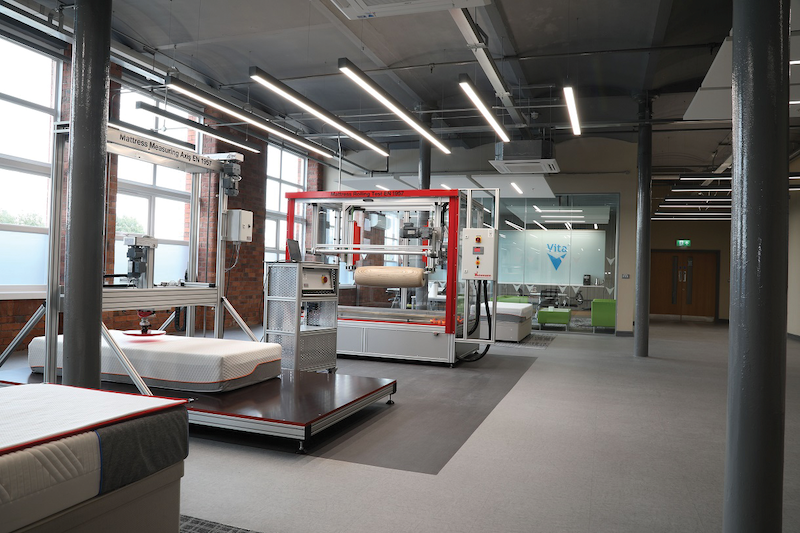
features a variety of advanced foam testing equipment.
Vita was the first flexible polyurethane foam manufacturer to have its CO₂ emission reduction targets validated by independent climate scientists through the global Science Based Targets initiative, says Natalie Watson, Vita’s head of sustainability. The aim of the targets is to limit global warming to less than 2 degrees Celsius above preindustrial levels by 2030. The Science Based Targets initiative’s validation team has determined that Vita is on track for a 1.5-degree Celsius warming limit — the most ambitious designation available through the evaluation process, according to the company.
In addition, Vita recently received a gold medal from EcoVadis, a provider of business sustainability ratings, ranking the company in the top 3% of assessed organizations worldwide.
“Our science-based approach to environmental claims and pioneering life cycle methodologies can help define the new standard for the flexible PU industry,” Watson says. “It also will help increase transparency across the value chain.”
According to Watson, the company’s testing has documented that the foam technologies used to create the VitaFirst mattress generate at least 40% less CO2 than a conventional Vita foam mattress.
“The crucial aspect about our new product development and design is the fact that the sustainable benefits can now be substantiated by science-based data that has been verified by independent third parties,” Watson says. “This provides our customers with the assurance that when they buy from us, they can make informed choices that will assist them in achieving their own goals.”
She adds that bedding producers also can use the data to weigh potential trade-offs — such as levels of CO₂ reduction and percentage of sustainable content versus price — to make more informed sourcing decisions.
“We have created a special configurator tool to help customers make those calculations,” Watson says.
Power of partnerships
Strategic partnerships with leaders in academia and the chemicals industry, including collaborations with Dow and Evonik, have helped Vita achieve sustainability goals. Vita has also been working closely with other suppliers and customers.
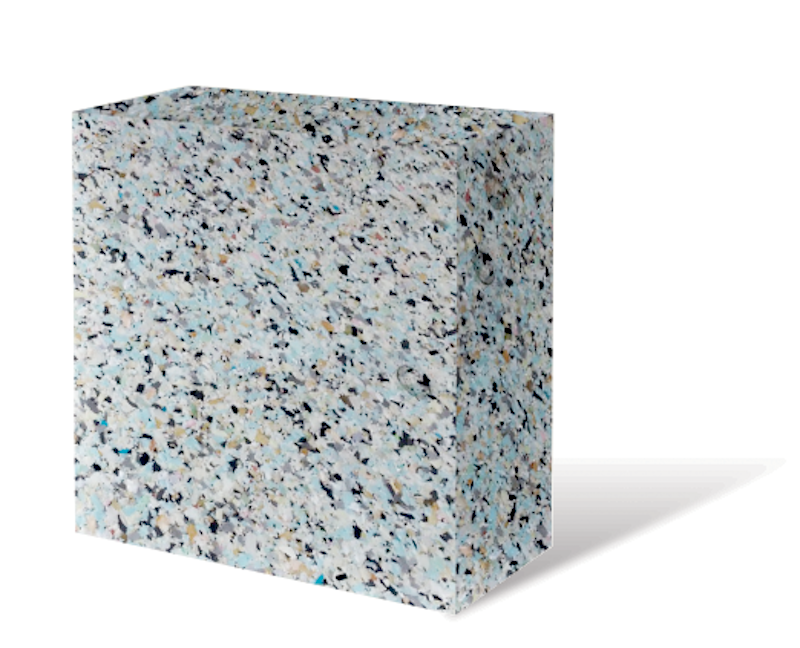
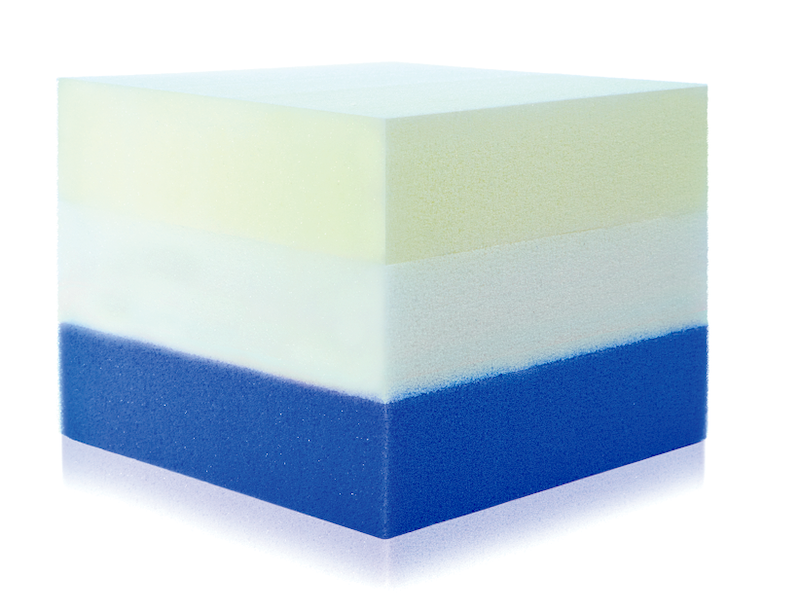
“We all share a common goal to use all the tools at our disposal to innovate and protect our planet for future generations,” Hoek says.
Along with the advances being made in product sustainability, Vita’s latest sustainability report outlines the company’s progress in reducing the environmental footprint of its operations. For example, in 2022, Vita diverted 25,422 tons of excess trim material from landfills and repurposed it. The foam offcuts created during the production process are used to create carpet underlay and artificial turf underlay. All the trim foam generated within Vita is repurposed, along with any trim collected from Vita’s customers.
In 2022, Vita also achieved its initial target to use 100% renewable electricity by 2030 — eight years ahead of schedule.
In addition, Vita has made a commitment to incorporate the principles of the United Nations Global Compact into its strategy, culture and daily operations. The company will work in collaboration on projects that promote the UN’s Sustainable Development Goals, including implementing practices to tackle poverty and inequality, and striving to create a better world.
“At Vita, our heart and soul are dedicated to enhancing everyday life by delivering performance and comfort,” Hoek says. “At the same time, our mission requires that we mitigate any negative impact our business might have on future generations. We aim to achieve this by focusing on the circularity and decarbonization of our products and processes.”
Watson adds that, from now on, every one of Vita’s new foams will have a sustainable option.
Growing footprint
Vita operates 37 production, office and testing facilities. Its two divisions — Comfort (bedding and furniture) and Technical & Flooring (automotive, aviation and construction applications and carpet underlay) — offer a wide range of flexible polyurethane foam, Talalay latex and flooring products to customers across a broad range of industries. The company’s pan-European operating base enables it to serve local, regional and multinational customers throughout Europe, and in specific markets across the globe, such as the United States, where its Vita Talalay latex line has a strong presence.
Sleep foams account for nearly half of Vita’s total business worldwide. The company generates 40% of its total revenues in the United Kingdom and the Irish Republic and about 60% in continental Europe. Lately, Vita has seen good growth in the eastern European countries, where it has acquired additional production facilities and beefed up its capabilities. The United States generates a relatively small percentage of the company’s revenues, but Vita is always scanning the horizon for emerging opportunities in this market.
“The ISPA EXPO in March provided a good opportunity for us to talk to current and potential customers about their needs,” Lewis says. “Our Vita Talalay line continues to be a steady performer, and our new foams may open new doors for us, as well.”
Lewis says that Vita had discussions with several leading U.S. bedding producers during ISPA EXPO about “the European market and their interest in that and how we might help them.”
And Vita’s relationship with European boxed bed brands and major producers will create opportunities as they look to expand in other parts of the world. “They’re asking us to support them as they enter new markets,” Lewis says, adding that Vita’s “growing portfolio of unique, sustainable foams” is an increasingly popular topic of conversation when it comes to growth strategies.
A major milestone

On Sept. 20, Vita will mark its 75th anniversary. To celebrate the occasion, the company will hold special events at each of its facilities. In addition, Vita will share on social media photos from its archives that salute the company’s rich history, its legacy of innovation and the generations of people who have contributed to its success.
“When you visit our factory floors, it’s not uncommon to see people whose families have worked for Vita for multiple generations,” says Watson, who joined the company in 2022. “Even though we’re not a family business, we have a family culture, with a close-knit community kind of team spirit in which everyone works together to move the business forward.”
“There are a lot of things that happened during the past 75 years that got us where we are today, but the one element that has been a constant in our success is our people,” Hoek adds. “Even though we’re now a rather large company with nearly $1.1 billion in revenue and 3,000 employees, we’re still a place where everyone wakes up on Monday and tries to do their job a little bit better than they did the previous week.”
Reflecting this mindset of seeking constant improvement, Vita opened its fourth Technical Innovation Centre in Accrington, England, in 2021. The company also has innovation centers in Corby, England, (for flooring) and in Middleton (for comfort products), as well as in Lithuania. Together, they represent a $1.6 million investment by Vita.
The newest center features a state-of-the-art pilot plant that enables the company to improve its understanding of various chemical formulations and production parameters. The facility’s team works with employees and customers across Europe to conduct research and develop highly engineered and customized polyurethane foams.
The Vita Group won four Interzum awards in recognition of its sustainable foam technologies.
“Product innovation is the lifeblood of our business,” Lewis says. “Our innovation centers allow us to apply science to sleep to identify new formulations that deliver the desired level of comfort, cooling and durability while also limiting the carbon footprint or whatever other sustainability criteria we are trying to achieve. They enable us to replicate what a consumer will experience with a bed before it goes into production.”
Similarly, Vita gains powerful insights into consumers’ needs and desires through its Usleep division. Vita acquired Usleep (formerly Duflex Foam Ltd.) in 2021 from Northedge Capital LLP. Usleep produces a range of foam, innerspring and hybrid mattresses for a number of the United Kingdom’s leading mattress retailers and boxed bed brands. It operates two production sites in England.
“Usleep offers a turnkey portfolio of services,” Lewis says. “We can design the mattress, produce the foams that are needed, build the mattress and then deliver it directly to someone’s house. It’s a complete offering that gives us a unique view into the market, from design and production on through to delivery.”
To compete in today’s tough global marketplace, “companies need to stay nimble and open to change,” Hoek says, adding that during times of crisis, such as the global Covid-19 pandemic, “everything can turn on a dime.”
“We want to make sure we always have our ear on the rail so that we can stay ahead of whatever is coming next,” he says.
As Vita’s leader, Hoek works hard to make sure he has the right teams in place to respond to sudden challenges. “We have a great mix of experienced veterans who’ve been with Vita for a long time and young talent with a fresh perspective,” he says. “The world is changing very fast, and our goal is to stay focused on our mission while also inserting additional agility and creativity into our culture.”
Read more on the Vita Group: The Vita Group Surpasses Sustainability Targets .




